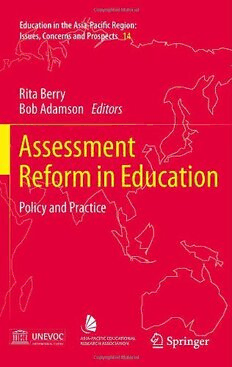Download Assessment Reform in Education: Policy and Practice PDF Free - Full Version
Download Assessment Reform in Education: Policy and Practice by Rita Berry, Bob Adamson (auth.), Rita Berry, Bob Adamson (eds.) in PDF format completely FREE. No registration required, no payment needed. Get instant access to this valuable resource on PDFdrive.to!
About Assessment Reform in Education: Policy and Practice
The early 21st century saw education reforms in many countries that were driven by new economic imperatives and that generally called for a realignment of assessment concepts to match the prevailing educational goals. Divided into two sections and fourteen chapters, this book provides an interpretation of why current assessment policies take the form that they do and the role and status of assessment for learning in the policy-making debates, and identifies the problems and challenges that have occurred and the resolutions that might be proposed. The chapters in the first section, assessment reform experiences, review the history and development of assessment policy and practice in different countries around the world and focus on the issues related to assessment reform in these countries. The salient features of the issues identified are discussed in the second section, issues in the spotlight, of the book. The chapters in this section analyze the origins/causes and discuss complexities, tensions, dilemmas and/or possibilities associated with the issue as well as setting out the implications of the issue for the future of assessment reform, and possible ways forward.
Detailed Information
| Author: | Rita Berry, Bob Adamson (auth.), Rita Berry, Bob Adamson (eds.) |
|---|---|
| Publication Year: | 2011 |
| ISBN: | 9789400707290 |
| Pages: | 242 |
| Language: | English |
| File Size: | 2.344 |
| Format: | |
| Price: | FREE |
Safe & Secure Download - No registration required
Why Choose PDFdrive for Your Free Assessment Reform in Education: Policy and Practice Download?
- 100% Free: No hidden fees or subscriptions required for one book every day.
- No Registration: Immediate access is available without creating accounts for one book every day.
- Safe and Secure: Clean downloads without malware or viruses
- Multiple Formats: PDF, MOBI, Mpub,... optimized for all devices
- Educational Resource: Supporting knowledge sharing and learning
Frequently Asked Questions
Is it really free to download Assessment Reform in Education: Policy and Practice PDF?
Yes, on https://PDFdrive.to you can download Assessment Reform in Education: Policy and Practice by Rita Berry, Bob Adamson (auth.), Rita Berry, Bob Adamson (eds.) completely free. We don't require any payment, subscription, or registration to access this PDF file. For 3 books every day.
How can I read Assessment Reform in Education: Policy and Practice on my mobile device?
After downloading Assessment Reform in Education: Policy and Practice PDF, you can open it with any PDF reader app on your phone or tablet. We recommend using Adobe Acrobat Reader, Apple Books, or Google Play Books for the best reading experience.
Is this the full version of Assessment Reform in Education: Policy and Practice?
Yes, this is the complete PDF version of Assessment Reform in Education: Policy and Practice by Rita Berry, Bob Adamson (auth.), Rita Berry, Bob Adamson (eds.). You will be able to read the entire content as in the printed version without missing any pages.
Is it legal to download Assessment Reform in Education: Policy and Practice PDF for free?
https://PDFdrive.to provides links to free educational resources available online. We do not store any files on our servers. Please be aware of copyright laws in your country before downloading.
The materials shared are intended for research, educational, and personal use in accordance with fair use principles.

